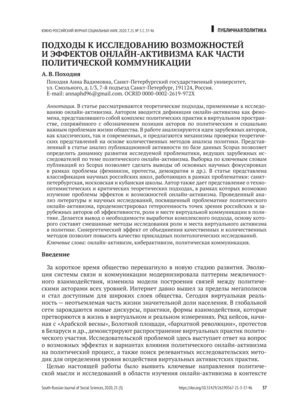Аннотация
В статье рассматриваются теоретические подходы, применимые к исследованию онлайн-активизма. Автором вводится дефиниция онлайн-активизма как феномена, представлявшего собой комплекс политических практик в виртуальном пространстве, сопряжённого с обозначением позиции акторов по политическим и социально важным проблемам жизни общества. В работе анализируются идеи зарубежных авторов, как классических, так и современных, и предлагаются механизмы проверки теоретических представлений на основе количественных методов анализа политики. Представленный в статье анализ публикационной активности по базе данных Scopus позволяет определить динамику развития исследуемой проблематики, ведущих зарубежных исследователей по теме политического онлайн-активизма. Выборка по ключевым словам публикаций из Scopus позволяет сделать выводы об основных научных фокусировках в рамках проблемы (феминизм, протесты, демократия и др.). В статье представлена классификация научных российских школ, работающих в рамках проблематики: санкт-петербургская, московская и кубанская школы. Автор также дает представление о технооптимистических и критических теоретических подходах, в рамках которых возможно изучение проблемы эффектов и возможностей онлайн-активизма. Проведенный анализ литературы и научных исследований, посвященный проблематике политического онлайн-активизма, продемонстрировал гетерогенность точек зрения российских и зарубежных авторов об эффективности, роли и месте виртуальной коммуникации в политике. Делается вывод о необходимости выработки комплексного подхода, основу которого составят смешанные методы исследования роли и места виртуального активизма в политике. Синергетический эффект от объединения качественных и количественных методов позволит повысить качество прикладных политологических исследований.
Ключевые слова
Библиографические ссылки
Быков, И.А., Гладченко, И.А. (2019). К вопросу об исследованиях мобилизационного контента в социальных медиа. В Стратегические коммуникации в современном мире. Сборник материалов по результатам научно-практических конференций (с. 214–222). Саратов: Издательство "Саратовский источник".
Володенков, С.В. (2019). Влияние технологий интернет-коммуникаций на современные общественно-политические процессы: сценарии, вызовы и акторы. Мониторинг общественного мнения: Экономические и социальные перемены, 5, 341–364.
Гидденс, Э. (2005). Социология. Москва: Едиториал УРСС.
Кастельс, М. (2000). Информационная эпоха: экономика, общество и культура. Мoсква: ГУ ВШЭ.
Кастельс, М. (2016). Власть коммуникации. Москва: Издательский Дом Высшей школы экономики.
Курочкин, А.В., Никифоров, А.А. (2015) Гражданские инициативы в условиях сетевого общества: новые возможности и ограничения. Современные исследования социальных проблем, 1(45), 239–252.
Лебон, Г. (2018). Психология народов и масс. Москва: Издательство АСТ.
Липпман, У. (2014). Общественное мнение. Москва: Институт Фонда «Общественное мнение».
Ловинк, Г. (2019). Критическая теория интернета. Москва: Ад Маргинем Пресс.
Луман, Н.Л. (2004). Общество как социальная система. Москва: Издательство «Логос».
Луман, Н.Л. (2005). Реальность масс медиа. Москва: Праксис.
Мартьянов, Д.С. (2019). Управляемость виртуальных сообществ: сравнительный анализ политизированных групп Вконтакте. Журнал политических исследований, 3, 79–93.
Мирошниченко, И.В., Рябченко, Н.А. (2015). Сетевые ресурсы развития локальной политики. Среднерусский вестник общественных наук, 5, 38–49.
Морозов, Е.М. (2014). Интернет как иллюзия. Обратная сторона сети. Москва: Corpus.
Рейнгольд, Г. (2006). Умная толпа: Новая социальная революция. Москва: Фаир-пресс.
Рябченко, Н.А., Гнедаш, А.А. (2016). Цифровой активизм: новые медиа, гражданские приложения и технологические сообщества как основания для социально-политических изменений. В Сборник научных статей. Труды XIX Международной объединенной научной конференции «Интернет и современное общество (с. 48–55). Санкт-Петербург: Санкт-Петербургский национальный исследовательский университет информационных технологий, механики и оптики.
Сморгунов, Л.В. (ред.) (2013). Сетевой анализ публичной политики. Москва: РГ-Пресс.
Федорченко, С.В. (2019). Сетевой полис: гражданин на перекрестке реальной и виртуальной политики. Научно-аналитический журнал Обозреватель, 4, 68–85.
Филилипс, У (2016). Трололо: Нельзя просто так взять и выпустить книгу про троллинг. Москва: Альпина Паблишер.
Шерстобитов, А.С., Брянов, К.А. (2013). Технологии политической мобилизации в социальной сети «Вконтакте»: сетевой анализ протестного и провластного сегментов. Исторические, философские, политические и юридические науки, культурология и искусствоведение. Вопросы теории и практики, 10–1, 196–202.
Bastos, М., Mercea, D. (2016). Serial Activists: Political Twitter Beyond Influentials and the Twittertariat. New Media & Society, 10, 2359–2378.
Earl, J. (2011). Digitally Enabled Social Change: Activism in the Internet Age. Cambridge: Mit Press.
Earl, J. (2016). Protest Online: Theorizing the Consequences of Online Engagement. Cambridge University Press.
Habermas, J. (1992). Further Reflections on the Public Sphere. In Calhoun C.J. (Ed.) Habermas and the Public Sphere (pp. 421–461). Cambridge Mass.: MIT Рress.
Hill, S. (2013). Digital Revolutions. Activism in the Internet Age. Oxford: New Internationalist Publications Ltd.
Lasswell, H. (2007). The Structure and Function of Communication in Society. In H. Lasswell The Communication of Ideas (pp. 10–26). New York: The Institute of Religious and Social Studies.
Park, H.W. (2012). Measuring Twitter-based Political Participation and Deliberation in the South Korean Context by Using Social Network and Triple Helix Indicators. Scientometrics, 1, 121–140.
Park, H.W. (2019). Big Data Analysis and Modeling of Disinformation Consumption and Diffusion on YouTube. Retrieved from https://www.researchgate.net/publication/337080707_Big_Data_Analysis_and_Modeling_of_Disinformation_Consumption_and_Diffusion_on_YouTube
Shirky, С. (2011). The Political Power of Social Media Technology, the Public Sphere, and Political Change. Foreign Affairs, 1, 28–41.
Spulber, D.F., Yoo, C.S. (2009). Networks in Telecommunications: Economics and Law. Cambridge University Press.


